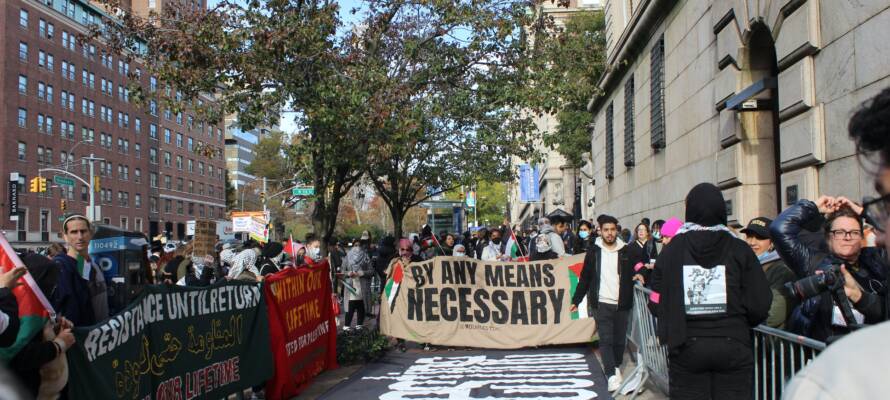The Faculty Against Antisemitism Movement (FAAM) consists of faculty who will call administrations to account for dealing with antisemitic incidents as forcefully as other forms of racism.
By Dion J. PIerre, The Algemeiner
Over 1,000 university professors will participate in a new campaign to show solidarity with Jewish students experiencing levels of antisemitism that are without precedent in the history of the United States, the Academic Engagement Network (AEN), which promotes academic freedom, announced on Tuesday.
Titled “KeeptheLightOn,” the initiative comes amid a reckoning of congressional investigations, lawsuits, and civil rights inquiries prompted by an explosion of antisemitic discrimination at some of America’s most prestigious universities.
It will see the formation of a new group, the Faculty Against Antisemitism Movement (FAAM), comprising professors from across the US who will pressure senior administrators at their schools to address anti-Jewish hatred as robustly as other forms of racism.
“We have written books, op-eds, and articles, but they are not penetrating the echo chamber of anti-Zionist antisemitism,” Southwestern University English professor Michael Saenger said in a press release. “As with previous protest movements, visual displays are sometimes necessary to get people to stop demonizing marginalized groups.
We need to respond to bullying and hate, directed against ourselves and Jewish students, more directly and more personally: by visibly advocating for a university that treats Jews as people, and that treats Israel as a nation.”
As part of the campaign, FAAM professors will leave their office lights on after hours to “publicly demonstrate their commitment to fighting antisemitism.” AEN added on Tuesday that the lights will “also symbolize the faculty’s commitment to ‘light a fire’ under administrators to ensure a better academic year ahead.”
“Keep the Light On” was inspired by University of California, Berkeley professor Richard Hassner, who last month held what was widely believed to be the first teacher “sleep-in” protest of antisemitism, AEN said.
For two weeks, Hassner lived in his office until administrators agreed to stop an anti-Zionist group’s blockade of a campus foot-bridge which made it impossible for Jewish students to cross without being verbally abused.
Numerous Jewish faculty members at other campuses have also begun stepping up and demanding a change. Some have organized faculty trips to Israel.
Others have cobbled their peers together to form groups — such as Yale’s Forum for Jewish Faculty & Friends and Indiana University’s Faculty and Staff for Israel — which have since grown exponentially and will serve as a well of support for FAAM.
“The FAAM initiative is both a distressing sign of the times and a hopeful symbol for the future not only for Jews but also for the academy,” Smith College professor and AEN advisory board member Donna Robinson Divine said. “An academy that has become the core location for an activism promoting social justice cannot sustain its credibility by tolerating hostile attacks against its Jewish student and faculty. Nor can education leaders preserve the legitimacy of the universities over which they preside by ignoring the recycling of this old and dangerous hatred. Rooting out antisemitism in classrooms, lecture halls, and social gatherings is thus as important for Jewish students and faculty as it is for the academy and the nation.”
As previously reported, Jewish college students have never faced such extreme levels of hatred. Since Oct. 7 — when Hamas-led Palestinian terrorists invaded Israel, massacred 1,200 people, and kidnapped 253 others as hostages — they have endured death threats, physical assaults, and volleys of racist verbal attacks unlike anything seen in the US since the 1950s.
Many college officials at first responded to the problem sluggishly, according to critics, who noted universities offered a host of reasons for why antisemitic speech should be protected even as they censored students and professors who uttered statements perceived as being conservative.
At the same time, progressive thought leaders came under fire for hesitating to acknowledge a swelling of antisemitic attitudes in institutions and organizations reputed to be champions of civil rights and persecuted minority groups.
One recent study found that US universities have demonstrated an “anti-Jewish double standard” by responding to Hamas’ Oct. 7 massacre across southern Israel and the ensuing surge in campus antisemitism much less forcefully than they did to crimes perpetrated against African Americans and Asians.
The situation changed after three presidents of elite universities were hauled before the US House Committee on Education and the Workforce to account for their handling of antisemitism and said on the record that there are cases in which they would decline to punish students who called for a genocide of the Jewish people.
The stunning admissions prompted the resignations of Elizabeth M. Magill as president of University of Pennsylvania and eventually of Claudine Gay, Harvard University’s former president, who would not leave until a series of reporters exposed her as a serial plagiarist.
The US Congress is currently investigating whether several colleges intentionally ignored discrimination when its victims were Jewish.
